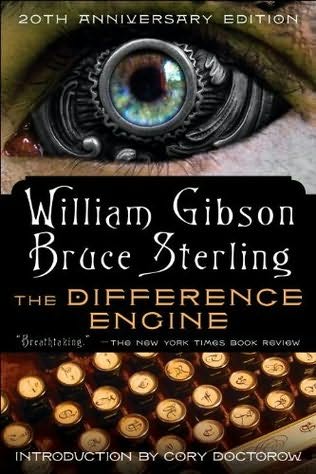
Scifi fans revere the name William Gibson. His classic book Neuromancer single-handedly started the cyberpunk genre, and introduced the word cyberspace. Films like The Matrix and Ghost in the Shell all trace their lineage to Gibson's vision of a bleak, dystopian, computer run world. And while I'm not too familiar with his work, Bruce Sterling is another cyberpunk author of some renown. So what are the two doing writing a book set in Victorian London?
Starting a new Scifi genre, that's what.
You see back in the 19th century, English mathematician Charles Babbage designed what is probably the first programmable computer. Made from gears and mechanical parts, Babbage's analytical engine was ahead of its time. Too ahead. Babbage died before his vision could be completed. But, what if Babbage had perfected his design? What if the computer revolution came a full century ahead of its time? Perfectly coinciding with the Industrial Revolution?
Say hello to Steampunk, where the 19th century is re-imagined into a more high-tech world.
Gibson and Sterling paint a wonderfully detailed world where the Engines have touched every facet of everyday life. From mechanized animated displays, to automated factories, to gargantuan government engines that store data about everyone in the realm. In this world three people, unrelated at first, have their lives changed and intertwined when a mysterious set of punch-cards, a computer program, makes its appearance. Shady characters stalk them and will do anything to get their hands on the cards. In the background, unrest boils as the rampant industrialization and the pollution it brings takes its toll on London.
Unfortunately, despite the teasingly good premise, the book fails to deliver. As typical of Gibson the world is vivid with detail, however the storytelling suffers. The book is basically a collection of three novellas, each covering one of the three major characters, and a small collection of short stories at the end. All three novellas end somewhat anti-climatically, and the characters failed to grip my attention and were quite forgettable actually. By the end of the novellas very little is achieved and many tantalizing questions are left unanswered. The book also had the chance to explore the effects of 2oth century tech on a 19th century world and values, but does very little of that.
Ironically, it was the last part of the book that I enjoyed the most. The short stories and news bites that compromise the book's final pages do a good job of fleshing out the world of The Difference Engine and go a long way into providing the book with actual closure. A somewhat chilling ending that is typical of Gibson. If only the whole book was in this format. Overall, The Difference Engine feels like an interesting exercise in speculative thought that found itself, clumsily, turning into a novel.



3 comments:
I liked 'The Difference Engine' quite a lot, but I preferred Gibson's 'Neuromancer' and 'Idoru'. Sterling seems to have lost the way in fiction, though. Nothing of his that I've read over the past five or six years has been noteworthy.
Take a look at Neal Stephenson's 'Cryptonomicon' if you get a chance. He later expanded that with a three-part prequel based in the time of Newton and Leibnitz. Each of those three are simply massive in both scope and weight!
Thanks for the recs John. I appreciate them, and I've already added them to wish list.
While I absoltuely loved 'Neuromancer', I just can't say the same about 'Idoru'. Maybe I need to reread it one of these days.
Nice story you got here. It would be great to read more concerning that theme. Thnx for sharing this information.
Sexy Lady
Busty Escorts London
Post a Comment